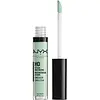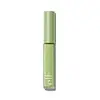What's inside
What's inside
 Key Ingredients
Key Ingredients

 Benefits
Benefits

 Concerns
Concerns

 Ingredients Side-by-side
Ingredients Side-by-side

Water
Skin ConditioningTrimethylsiloxyphenyl Dimethicone
Trimethylsiloxysilicate
EmollientGlycerin
HumectantSilica
AbrasiveIsononyl Isononanoate
EmollientSorbitan Olivate
EmulsifyingCaprylic/Capric Triglyceride
MaskingCocos Nucifera Oil
MaskingAloe Barbadensis Leaf Extract
EmollientTocopheryl Acetate
AntioxidantTriethoxycaprylylsilane
Euphorbia Cerifera Wax
Xanthan Gum
EmulsifyingAlumina
AbrasiveCaprylyl Glycol
EmollientPhenoxyethanol
PreservativeTitanium Dioxide
Cosmetic ColorantIron Oxides
CI 77742
Cosmetic ColorantCI 77007
Cosmetic ColorantCI 77289
Cosmetic ColorantCI 77288
Cosmetic ColorantCI 19140
Cosmetic ColorantWater, Trimethylsiloxyphenyl Dimethicone, Trimethylsiloxysilicate, Glycerin, Silica, Isononyl Isononanoate, Sorbitan Olivate, Caprylic/Capric Triglyceride, Cocos Nucifera Oil, Aloe Barbadensis Leaf Extract, Tocopheryl Acetate, Triethoxycaprylylsilane, Euphorbia Cerifera Wax, Xanthan Gum, Alumina, Caprylyl Glycol, Phenoxyethanol, Titanium Dioxide, Iron Oxides, CI 77742, CI 77007, CI 77289, CI 77288, CI 19140
Water
Skin ConditioningDimethicone
EmollientPropylene Glycol
HumectantOctyldodecanol
EmollientHydrogenated Polyisobutene
EmollientCeramide AP
Skin ConditioningPolyglyceryl-4 Isostearate
EmulsifyingBoron Nitride
AbsorbentCaprylic Acid
CleansingHydrogenated Styrene/Methylstyrene/Indene Copolymer
Sodium Chloride
MaskingDiethylhexyl Carbonate
EmollientAcrylates/Dimethicone Copolymer
Skin ConditioningVinyl Dimethicone/Methicone Silsesquioxane Crosspolymer
Mica
Cosmetic ColorantPhenoxyethanol
PreservativePropylene Carbonate
SolventIsopropyl Titanium Triisostearate
EmollientAlumina
AbrasiveEthylhexylglycerin
Skin ConditioningCaprylyl Glycol
EmollientDisodium EDTA
Pentaerythrityl Tetra-Di-T-Butyl Hydroxyhydrocinnamate
AntioxidantSodium Hyaluronate
HumectantCI 77891
Cosmetic ColorantCI 77288
Cosmetic ColorantCI 77492
Cosmetic ColorantUltramarines
Water, Dimethicone, Propylene Glycol, Octyldodecanol, Hydrogenated Polyisobutene, Ceramide AP, Polyglyceryl-4 Isostearate, Boron Nitride, Caprylic Acid, Hydrogenated Styrene/Methylstyrene/Indene Copolymer, Sodium Chloride, Diethylhexyl Carbonate, Acrylates/Dimethicone Copolymer, Vinyl Dimethicone/Methicone Silsesquioxane Crosspolymer, Mica, Phenoxyethanol, Propylene Carbonate, Isopropyl Titanium Triisostearate, Alumina, Ethylhexylglycerin, Caprylyl Glycol, Disodium EDTA, Pentaerythrityl Tetra-Di-T-Butyl Hydroxyhydrocinnamate, Sodium Hyaluronate, CI 77891, CI 77288, CI 77492, Ultramarines
 Reviews
Reviews

Ingredients Explained
These ingredients are found in both products.
Ingredients higher up in an ingredient list are typically present in a larger amount.
Alumina is another name for the compound aluminum oxide. It is used as a thickener, absorbent, and abrasive.
As an absorbent, alumina can give a mattifying effect. It is used in mineral sunscreens to help coat nano-sized filters, such as titanium dioxide. By increasing the size of the UV filters, these ingredients stay on the skin for a longer time. By coating small sized ingredients, alumina helps thicken a product.
Alumina may be used as an abrasive, or exfoliant.
Alumina is naturally occurring in the mineral corundum. Certain varieties of corundum create rubies and sapphires. Corundum is also the crystalline form of alumina.
Learn more about AluminaCaprylyl Glycol is a humectant and emollient, meaning it attracts and preserves moisture.
It is a common ingredient in many products, especially those designed to hydrate skin. The primary benefits are retaining moisture, skin softening, and promoting a healthy skin barrier.
Though Caprylyl Glycol is an alcohol derived from fatty acids, it is not the kind that can dry out skin.
This ingredient is also used as a preservative to extend the life of products. It has slight antimicrobial properties.
Learn more about Caprylyl GlycolCi 77288 is used to add green pigment to products.
Phenoxyethanol is a preservative that has germicide, antimicrobial, and aromatic properties. Studies show that phenoxyethanol can prevent microbial growth. By itself, it has a scent that is similar to that of a rose.
It's often used in formulations along with Caprylyl Glycol to preserve the shelf life of products.
Water. It's the most common cosmetic ingredient of all. You'll usually see it at the top of ingredient lists, meaning that it makes up the largest part of the product.
So why is it so popular? Water most often acts as a solvent - this means that it helps dissolve other ingredients into the formulation.
You'll also recognize water as that liquid we all need to stay alive. If you see this, drink a glass of water. Stay hydrated!
Learn more about Water